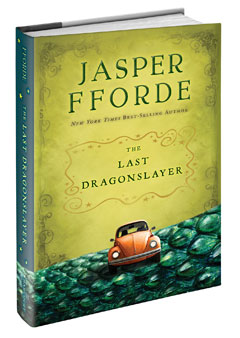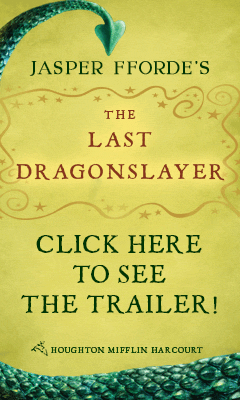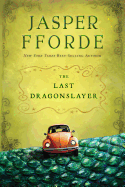The Last Dragonslayer: The Chronicles of Kazam, Book One
by Jasper Fforde
Jasper Fforde, a bestselling author for adults (The Eyre Affair), smoothly makes the transition to a younger audience with this humorous and heartwarming tale. He gives a nod to the lore of the Round Table with a cast of evildoers challenged by an orphan heroine, pure of heart, who sets out to do the right thing armed with the sword Exhorbitus.
As we meet Jennifer Strange, two weeks shy of her 16th birthday, magic is slowly leaking out of the world. Once-great wizards are reduced to delivering pizzas on magic carpets, charming moles out of gardens and removing illegally parked cars. Jennifer is the acting manager for the members of Kazam Mystical Arts Management in the Kingdom of Hereford of the Ununited Kingdoms. The book opens as she drives a group of wizards in her 1958 Volkswagen Beetle (her parents abandoned her as an infant in the Beetle) to rewire a house. "My job... was less about spells and enchantments, diplomacy and bureaucracy, than about babysitting," Jennifer admits. She's been in charge of the wizard work force since the Great Zambini, to whom she's bonded by indentured servitude until age 18, disappeared six months ago.
Mother Zenobia, who ran the orphanage where Jennifer grew up, remains a trusted friend and counselor to the teenager. Recently, the woman sent Jennifer a new foundling-cum-indentured-servant, 12-year-old Tiger Prawns. Eager to learn and a quick study, Tiger has become an ally to Jennifer in the running of the household and business.
The dragon population is decreasing, and many believe that its diminishment is related to the dwindling magic. They are down to one dragon: Maltcassion. On the same day our story begins, fellow wizard Kevin Zipp shares with Jennifer his vision: that Maltcassion will "die by the sword of a Dragonslayer" within a week. Jennifer calls another pre-cog colleague who nails the deed down to Sunday at noon--information she keeps to herself. Once the dragon dies, the Dragonlands become open territory--anyone and everyone can come forward to claim a piece of it. Mr. Trimble of Trimble, Trimble, Trimble, Trimble, and Trimble has gotten wind of the prediction and wants to hire one of Zambini's pre-cogs to pinpoint the hour of the dragon's demise for a potload of cash. He wants to secure the Dragonlands on behalf of ConStuff ("which dominated the Ununited Kingdom's cheap and shabby goods market.... No one much liked them, but few didn't shop there"). Jennifer shuns him--and his money--much to the chagrin of the wizard Lady Mawgon. Two royal policemen come by next to confirm the prediction they've heard (on behalf of King Snodd IV). They tell Jennifer that the king's pre-cog predicted that "a young woman named Strange would be involved in the Dragondeath." How can this be? Jennifer wonders. It must be a mistake.
When the house of Zambini, led by Lady Mawgon, is split over the question of whether to sell out to ConStuff, Jennifer goes in search of answers... from William of Anorak. Obsessed with facts, William quickly confirms Jennifer's identity and history and points her to Brian Spalding, "worshipful Dragonslayer," at the Dog and Ferret on Wimpole Street.
Fforde fills his tale with colorful characters--not just the wizards, William of Anorak, Mother Zenobia and Brian Spalding, but also the Mighty Shandar, who famously created the Dragonlands to protect the citizenry from the carnivorous dragons. As Mother Zenobia warns Jennifer, "Money is a form of alchemy... it turns kind, normal people into greed-mongers." It also causes them to masquerade as good guys, and, conversely, when the life of the last dragon hangs in the balance, some shady characters find the light.
The story proceeds at a breakneck pace, as royalty, corporate henchmen and everyday people trying to hold their own vie for the Dragonlands. The author creates an Arthurian-style tale set in modern times, where the memory of once-strong magic still lingers and the possibility of its restoration is tantalizing to some while the lure of property and wealth dazzles others. Greed and integrity, fate and free will battle it out, and Fforde keeps readers guessing to the final page. His thrilling conclusion still leaves room in the coming installments to solve the mystery of Jennifer Strange's parentage, and the fates of the Great Zambini and the Mighty Shandar. Readers will be eager to return to this magical world that shares much in common with our own. --Jennifer M. Brown








.jpg) Well known for his bestselling Thursday Next series for adults (begun with The Eyre Affair), Jasper Fforde envisioned The Last Dragonslayer as a stand-alone novel, at the urging of his sister, who requested a "dragon book." But he soon realized he could tell a lot more in this world. "It's quite an odd one, and certainly one with a lot of scope," Fforde observed, "the Ununited Kingdoms, for example, offer plenty of room for expansion." There are three planned.
Well known for his bestselling Thursday Next series for adults (begun with The Eyre Affair), Jasper Fforde envisioned The Last Dragonslayer as a stand-alone novel, at the urging of his sister, who requested a "dragon book." But he soon realized he could tell a lot more in this world. "It's quite an odd one, and certainly one with a lot of scope," Fforde observed, "the Ununited Kingdoms, for example, offer plenty of room for expansion." There are three planned.